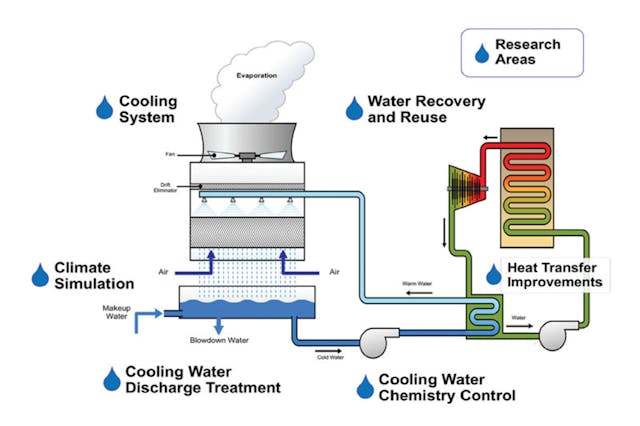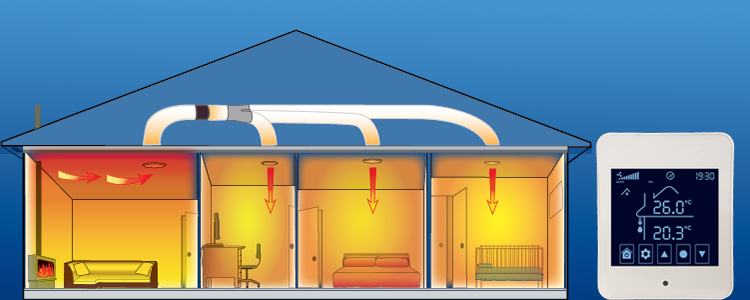DVS Heat Transfer Systems in Detroit: How Local Industries Are Innovating Heat Transfer Solutions
The Duty of Heat Transfer Solutions in Sustainable Energy Solutions for the Future
Heat transfer systems are essential in the quest for lasting energy remedies. They maximize thermal energy administration, enhancing the performance of renewable innovations. By utilizing mechanisms like radiation, transmission, and convection, these systems minimize energy losses. Their duty in solar thermal and geothermal applications is specifically significant. As developments emerge, the capacity for more advancements raises important questions about future energy techniques. What advancements will form the landscape of sustainable power?
Recognizing Heat Transfer Equipments

The Significance of Thermal Energy Administration
Efficient thermal power administration is vital for optimizing power efficiency and lessening waste in different systems. By controling temperature and optimizing Heat transfer procedures, companies can markedly minimize power consumption and operational prices. Effective monitoring entails the execution of advanced innovations and techniques that monitor and manage thermal problems within systems, ensuring that energy resources are used successfully. In enhancement, correct thermal power monitoring adds to minimizing greenhouse gas exhausts, aligning with international sustainability goals. It also boosts system integrity and performance, resulting in enhanced item high quality and longer tools lifespan. Eventually, prioritizing thermal power management is a crucial step in the direction of producing extra lasting power options and cultivating a responsible method to energy consumption in commercial and residential contexts.
Applications of Heat Transfer in Renewable Resource
While various renewable power resources assure sustainability, the reliable application of Heat transfer plays a crucial function in their efficiency. In wind power systems, Heat transfer is used for turbine part air conditioning, enhancing efficiency and long life. Geothermal energy relies upon effective Heat exchange in between the planet's subsurface and the fluid circulating in the system, taking full advantage of energy removal. Biomass energy procedures likewise take advantage of Heat transfer, as it assists in transforming natural materials right into functional fuel via pyrolysis and gasification. Furthermore, in hydropower, keeping ideal temperature levels in storage tanks can enhance energy result. Each of these applications demonstrates the critical value of Heat transfer systems in enhancing renewable resource modern technologies, eventually adding to a more lasting power future.
Enhancing Solar Thermal Power Effectiveness
As solar thermal power systems remain to progress, enhancing their performance has ended up being crucial for optimizing power result. Advances in Heat transfer innovations, such as enhanced thermal storage space products and innovative Heat exchangers, play a significant function in enhancing efficiency. By making use of advanced products that have premium thermal conductivity, systems can transfer and catch Heat much more efficiently. Additionally, integrating radar that adhere to the sunlight's path assurances that collectors get perfect solar direct exposure throughout the day. Utilizing nanotechnology in solar absorbers can additionally raise energy absorption prices. Furthermore, integrating automated control systems assists manage temperature levels and manage power circulation successfully, bring about reduced losses and improved overall system performance. These enhancements pave the way for more lasting solar thermal energy solutions in the future.
Geothermal Home Heating: A Sustainable Solution
Geothermal heating offers a sensible option for sustainable power, providing substantial environmental advantages with minimized greenhouse gas emissions. Its efficiency and cost-effectiveness make it an eye-catching choice to typical heater. Nonetheless, obstacles connected to execution needs to be addressed to optimize its possible effect.
Ecological Advantages of Geothermal
Typical heating approaches add substantially to greenhouse gas discharges, geothermal home heating presents an engaging alternative that reduces environmental effect. By harnessing the Earth's inner Heat, geothermal systems utilize an eco-friendly energy source, considerably lowering dependence on fossil gas. This approach creates very little carbon exhausts, making it a cleaner choice for commercial and property home heating. In addition, geothermal systems advertise power effectiveness, as they need less energy compared to standard furnace. DVS Heat Transfer Systems. The use of geothermal energy also assists in reducing air pollution, boosting regional air quality and public health. As a lasting option, geothermal heating sustains climate change mitigation efforts, positioning itself as a vital element in the shift towards a greener future
Effectiveness and Cost-Effectiveness
Just how does geothermal home heating gauge up in regards to performance and cost-effectiveness contrasted to standard heating systems? Geothermal home heating shows premium effectiveness, frequently attaining a coefficient of performance (POLICE OFFICER) of 3 to 5, meaning it produces three to 5 systems of Heat for each unit of electrical power consumed. This efficiency converts right into reduced operating expenses, particularly in areas with steady geothermal resources. Initial installation prices can be more than traditional systems; however, lasting cost savings on energy bills and lowered maintenance costs can counter these upfront financial investments. Furthermore, many governments incentivize geothermal systems via refunds and tax obligation debts, enhancing their cost-effectiveness. Generally, geothermal heating becomes a financially feasible and lasting choice to my latest blog post even more conventional heating solutions.
Application Challenges and Solutions
Many obstacles can impede the widespread application of geothermal heater, in spite of their clear benefits as a lasting energy solution. High preliminary installment costs usually discourage capitalists and home owners, making funding a substantial barrier. Furthermore, the geographical restrictions of ideal geothermal sites restrict ease of access in certain areas. Regional regulations and permitting procedures can additionally make complex task development, causing navigate here delays. Public recognition and understanding of geothermal systems remain low, hindering acceptance. To resolve these difficulties, targeted education and learning projects can boost open secret, while government rewards can minimize monetary problems. Teaming up with neighborhood authorities to simplify regulations may assist in smoother job authorizations, eventually advertising the adoption of geothermal home heating as a practical, sustainable energy option.
Advancements in Heat Transfer Technologies
Developments in Heat transfer modern technologies play a crucial function in improving energy efficiency and sustainability. Advanced Heat exchangers and phase modification materials are at the leading edge of these growths, providing considerable renovations in thermal monitoring. These technologies not only optimize power usage however likewise contribute to reducing ecological impact in various applications.
Advanced Heat Exchangers
Advanced Heat exchangers play a vital role in enhancing power performance throughout different applications in sustainable power services. These devices promote the transfer of Heat in between two or even more liquids, considerably decreasing energy consumption in processes such as commercial home heating, air conditioning, and power generation. Developments in products and design, such as making use of nanofluids and small setups, have led to improved thermal performance and minimized dimension demands. In addition, advancements in digital monitoring and control systems permit optimized procedure, further boosting performance. By lessening waste Heat and maximizing energy recuperation, advanced Heat exchangers add to reduce carbon footprints and support the shift towards eco-friendly technologies. Their proceeded growth is important for accomplishing global energy sustainability objectives.
Stage Adjustment Products
The assimilation of stage modification products (PCMs) into Heat transfer innovations represents a significant innovation in energy administration and efficiency. PCMs take in and launch thermal power during their phase modifications, allowing reliable temperature policy in building materials and energy systems. By keeping excess Heat during top durations and launching it when need rises, PCMs add to pack changing and power preservation - DVS Heat Transfer Systems. This capacity boosts the performance of renewable power systems, particularly in solar thermal applications. In addition, try this web-site PCMs can improve the thermal comfort of indoor atmospheres, decreasing dependence on traditional home heating and cooling techniques. As technologies in PCM formulations remain to arise, their duty in lasting power options is poised to grow, providing appealing avenues for future research and application

Future Leads for Heat Transfer in Sustainable Energy
As the demand for sustainable energy options remains to climb, the role of Heat transfer systems is coming to be increasingly important in forming future modern technologies. Innovations in layouts and products are anticipated to enhance efficiency in Heat transfer, minimizing energy losses in numerous applications. The combination of sophisticated thermal storage space systems, such as stage change products and thermochemical storage space, will allow far better management of energy sources. Research study into nanofluids and biomimetic Heat exchangers might better enhance thermal efficiency. The adoption of wise innovations will allow for real-time surveillance and adaptive control of Heat transfer procedures. These advancements are positioned to substantially add to the total performance and sustainability of power systems, leading the way for a much more energy-efficient future.
Frequently Asked Inquiries
Exactly How Can People Implement Heat Transfer Solution in your home?

Individuals can apply Heat transfer systems at home by mounting energy-efficient devices, utilizing glowing home heating, and enhancing insulation. These steps enhance power effectiveness, decrease prices, and promote lasting practices in residential settings.

What Are the Costs Associated With Installing Heat Transfer Solutions?
The expenses linked with mounting Heat transfer systems differ commonly, normally incorporating devices, installment labor, and maintenance. Aspects such as system kind, home size, and neighborhood regulations significantly influence the overall expenditure involved.
Exist Federal Government Motivations for Heat Transfer System Installations?
Federal government rewards for Heat transfer system installations differ by region and can include tax rebates, gives, and credit histories. These financial advantages aim to urge adoption, ultimately promoting energy performance and minimizing environmental effect within neighborhoods.
How Do Heat Transfer Solutions Impact Power Costs?
Heat transfer systems especially influence power bills by enhancing energy performance. By improving the transfer of Heat, these systems reduce power usage, leading to lower utility expenses and creating a much more lasting technique to power management.
What Upkeep Is Required for Heat Transfer Systems?
Upkeep for Heat transfer systems includes normal assessments, cleansing of components, examining liquid levels, making certain appropriate insulation, and changing worn parts. These jobs help preserve efficiency, stop malfunctions, and extend the system's functional life-span.
These systems help with the activity of thermal power from one medium to one more, enabling the transfer of Heat for energy, heating, or cooling generation functions. Geothermal energy depends on reliable Heat exchange between the earth's subsurface and the fluid circulating in the system, making best use of power removal. Furthermore, geothermal systems advertise energy effectiveness, as they need less energy compared to traditional heating systems. Advanced Heat exchangers play a necessary function in boosting power performance throughout different applications in lasting power services. Heat transfer systems significantly affect energy expenses by enhancing power effectiveness.